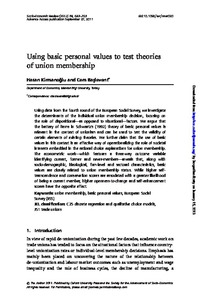Using basic personal values to test theories of union membership

Kirmanoglu, Hasan ; Baslevent, Cem
2012
10
4
683-703
individual variables ; survey ; trade unionization ; trade union membership
EU countries ; Switzerland ; Turkey ; Ukraine
Trade unionism
http://dx.doi.org/10.1093/ser/mwr020
English
Bibliogr.
"Using data from the fourth round of the European Social Survey, we investigate the determinants of the individual union membership decision, focusing on the role of dispositional -as opposed to situational- factors. We argue that the battery of items in Schwartz's (1992) theory of basic personal values is relevant in the context of unionism and can be used to test the validity of certain elements of existing theories. We further claim that the use of basic values in this context is an effective way of operationalizing the role of societal interests embedded in the rational choice explanations for union membership. The econometric work -which features a three-way outcome variable identifying current, former and never-members- reveals that, along with socio-demographic, ideological, firm-level and sectoral characteristics, basic values are closely related to union membership status. While higher self-transcendence and conservation scores are associated with a greater likelihood of being a current member, higher openness-to-change and self-enhancement scores have the opposite effect."
Digital
The ETUI is co-funded by the European Union. Views and opinions expressed are however those of the author(s) only and do not necessarily reflect those of the European Union or the ETUI.